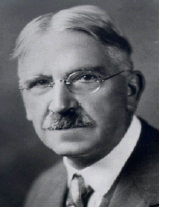Dewey on Education for Active Workers
John Dewey (1859–1952), the educational philosopher, anticipated a kind of learning that engaged with work in ways that in many respects anticipated the post-Fordist organization. Even at the beginning of the 20th century, Dewey, the advocate of authentic education, was imagining a kind of education which anticipated post-Fordist forms of work.

[W]hen we confine the education of those who work with their hands to a few years of schooling devoted for the most part to acquiring the use of rudimentary symbols at the expense of training in science, literature, and history, we fail to prepare the minds of workers to take advantage of this opportunity. More fundamental is the fact that the great majority of workers have no insight into the social aims of their pursuits and no direct personal interest in them. The results actually achieved are not the ends of their actions, but only of their employers. They do what they do, not freely and intelligently, but for the sake of the wage earned. It is this fact which … will make any education designed simply to give skill in such undertakings illiberal and immoral.
Nevertheless, there is already an opportunity which, keeping in mind the larger features of work, will reconcile liberal nurture with social serviceableness … And such an education will tend to do away with the evils of the existing economic situation. In the degree in which men have an active concern in the ends that control their activity, their activity becomes free or voluntary and loses its externally enforced and servile quality … In what is termed politics, democratic social organization makes provision for this direct participation in control ….
Dewey, John. 1916 (1966). Democracy and Education: An Introduction to the Philosophy of Education. New York: Free Press. pp. 259–260. || Amazon || WorldCat
